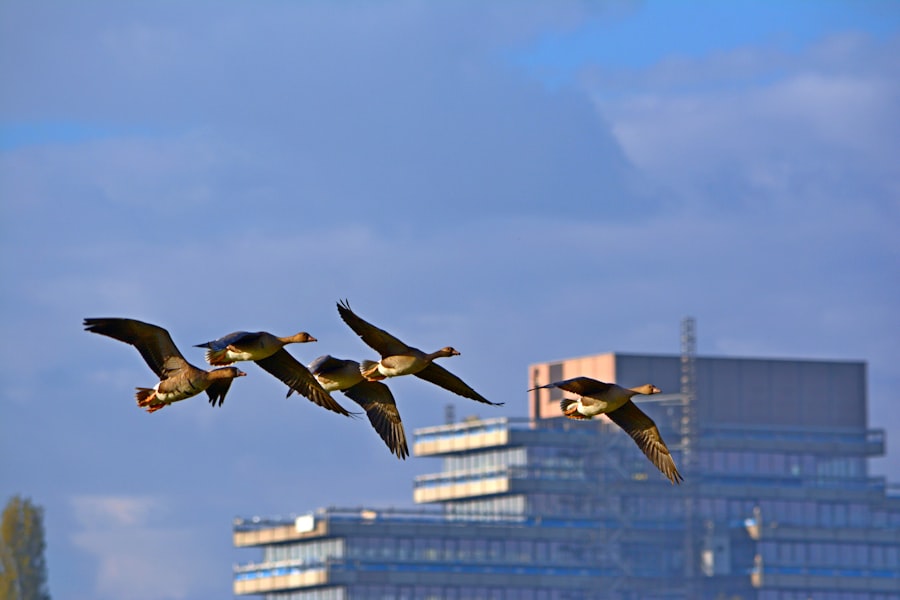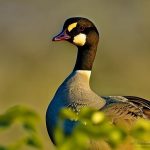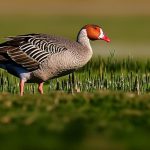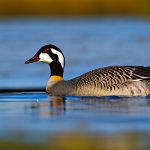Geese have a long history in Australia, dating back to the early days of European settlement. They were brought over by the first colonists as a source of food and feathers. Over the years, geese have become a popular choice for small-scale farmers and hobbyists due to their many benefits.
One of the main benefits of keeping geese is their ability to control pests. Geese are excellent grazers and can help keep grass and weed growth under control. They also eat insects, snails, and slugs, reducing the need for chemical pesticides. Additionally, geese can act as natural alarm systems, alerting you to any potential intruders or predators on your property.
Key Takeaways
- Keeping geese in Australia is a rewarding and enjoyable experience for many people.
- Choosing the right breed of geese is important, as different breeds have different needs and characteristics.
- Geese require adequate housing and fencing to keep them safe and healthy.
- Feeding and watering geese in Australia requires attention to their nutritional needs and access to clean water.
- Preventing disease and managing behavior are important aspects of keeping geese healthy and happy.
Choosing the Right Breed of Geese for Your Needs
There are several popular breeds of geese in Australia, each with its own unique characteristics and purposes. The most common breeds include Toulouse, Embden, Chinese, and African geese.
When choosing a breed of geese, it’s important to consider your specific needs and goals. If you’re primarily interested in meat production, then the Embden or Toulouse breeds are good choices as they are known for their large size and high meat yield. On the other hand, if you’re looking for geese that are good egg layers, then Chinese or African geese would be more suitable.
Other factors to consider when choosing a breed include temperament, climate adaptability, and availability in your area. Some breeds may be more docile and easier to handle, while others may be more aggressive or territorial. It’s also important to choose a breed that can withstand the climate conditions in your region.
Housing and Fencing Requirements for Geese
Geese require adequate housing and fencing to ensure their safety and well-being. The type of housing you choose will depend on the number of geese you have and the space available on your property.
For a small number of geese, a simple shed or coop with a fenced-in outdoor area will suffice. The shed should provide protection from the elements and predators, while the outdoor area should be securely fenced to prevent escape and keep out unwanted visitors.
If you have a larger flock of geese, you may need to invest in a more spacious and sturdy structure. A barn or large shed with separate nesting areas and ample ventilation is ideal. The outdoor area should be fenced with strong wire mesh or electric fencing to keep the geese contained.
Feeding and Watering Geese in Australia
Geese have specific dietary needs that must be met for optimal health and productivity. A balanced diet for geese consists of a combination of grains, greens, and protein sources.
The main component of a goose’s diet should be grains such as corn, wheat, and barley. These can be fed whole or ground into a mash. Greens such as grass, lettuce, and spinach should also be provided to supplement their diet. Additionally, geese require protein sources such as insects, worms, or commercial poultry feed to ensure proper growth and development.
In terms of watering requirements, geese need access to clean and fresh water at all times. They should have access to a shallow pond or pool where they can swim and clean themselves. If a natural water source is not available, a large trough or container filled with water should be provided.
Health and Disease Prevention for Geese
Like any livestock, geese are susceptible to certain health issues and diseases. It’s important to be aware of these common issues and take preventative measures to keep your geese healthy.
One common health issue in geese is respiratory infections. These can be caused by poor ventilation in their housing or exposure to damp conditions. Regular cleaning of their living quarters and providing adequate ventilation can help prevent respiratory infections.
Another common issue is foot problems, such as bumblefoot. This is an infection that affects the feet and can be caused by rough or uneven surfaces. Providing a clean and dry area for the geese to walk on can help prevent foot problems.
Regular vaccinations and deworming are also important for maintaining the health of your geese. Consult with a veterinarian to develop a vaccination and deworming schedule that is appropriate for your flock.
Geese Breeding and Incubation Tips

Geese have a specific breeding season, which typically occurs in the spring. During this time, the male geese, known as ganders, will become more aggressive and territorial. It’s important to provide separate nesting areas for each pair of geese to prevent fighting and ensure successful breeding.
Once the female goose, known as a goose, lays her eggs, they can be collected for incubation or left with the goose for natural incubation. If you choose to incubate the eggs yourself, they should be placed in a clean and warm incubator set at the appropriate temperature and humidity levels.
The incubation period for goose eggs is approximately 28-30 days. During this time, it’s important to monitor the temperature and humidity levels in the incubator and turn the eggs regularly to ensure proper development.
Managing Geese Behavior and Temperament
Geese have a reputation for being aggressive and territorial, but with proper handling and management, their behavior can be controlled. Understanding their behavior is key to managing their temperament.
Geese are naturally protective of their territory and will often hiss or honk at intruders. They may also become aggressive if they feel threatened or cornered. It’s important to establish yourself as the dominant figure in their environment through consistent handling and training.
Regular interaction with your geese from a young age can help establish trust and reduce aggression. Handling them gently and providing positive reinforcement can also help shape their behavior. It’s important to set boundaries and establish a routine to maintain control over their behavior.
Geese Egg Production and Harvesting
Geese are known for their egg-laying capabilities, with some breeds producing up to 50-60 eggs per year. The egg production cycle for geese typically begins in the spring and continues through the summer months.
To encourage egg production, it’s important to provide a comfortable and secure nesting area for the geese. This can be a simple nest box filled with straw or hay. The geese should have access to the nest box at all times and be able to lay their eggs in a quiet and undisturbed environment.
Once the eggs are laid, they can be collected daily to prevent them from being damaged or eaten by predators. It’s important to handle the eggs gently and store them in a cool and dry place until they are ready to be used or incubated.
Geese Meat Production and Processing
Geese are not only valued for their eggs but also for their meat. The meat of geese is known for its rich flavor and tenderness, making it a popular choice for gourmet dishes.
To produce high-quality meat, geese should be raised on a balanced diet that includes grains, greens, and protein sources. They should also have access to clean water at all times.
When it comes time to process the geese for meat, it’s important to do so in a humane and sanitary manner. This can be done by either slaughtering the geese yourself or taking them to a professional processor. The meat should be properly cleaned, dressed, and stored in a cool place until it is ready to be cooked or preserved.
Legal Considerations for Keeping Geese in Australia
Before starting your own goose flock, it’s important to familiarize yourself with the legal considerations and regulations surrounding keeping geese in Australia. While geese are generally allowed to be kept as livestock, there may be specific rules and requirements that vary by state or local government.
In some areas, permits or licenses may be required to keep geese, especially if you have a large number of birds or if you plan to sell their products. It’s important to check with your local agricultural department or council to ensure that you are in compliance with any regulations.
Keeping geese in Australia can be a rewarding and beneficial endeavor. They provide pest control, meat, eggs, and feathers while also adding beauty and charm to your property. By choosing the right breed, providing proper housing and nutrition, and managing their behavior and health, you can successfully raise geese for various purposes. Just be sure to familiarize yourself with any legal requirements and regulations before starting your own flock. So why not consider adding geese to your farm or backyard? They are sure to bring joy and productivity to your life.
If you’re interested in keeping geese in Australia, you might also find this article on chicken coop run plans from Poultry Wizard helpful. It provides valuable insights and tips on creating a safe and secure space for your geese to roam and graze. Check it out here. Additionally, Poultry Wizard offers a snaplock chicken coop that could be adapted for geese, ensuring convenience and ease of use. Learn more about it here. Lastly, if you’re looking for a chicken coop in Muskegon, Poultry Wizard has got you covered with their comprehensive guide. Discover the perfect coop for your geese here.
FAQs
What are geese?
Geese are waterfowl birds that belong to the family Anatidae. They are known for their long necks, webbed feet, and distinctive honking sound.
Why keep geese in Australia?
Geese can be kept in Australia for a variety of reasons, including as pets, for meat production, or for their eggs. They are also useful for weed control and can be used to keep grass and other vegetation under control.
What are some common breeds of geese in Australia?
Some common breeds of geese in Australia include the Embden, Toulouse, Chinese, and African. Each breed has its own unique characteristics and is suited to different purposes.
What do geese eat?
Geese are omnivores and will eat a variety of foods, including grass, grains, insects, and small animals. They should be provided with a balanced diet that includes both commercial feed and fresh foods.
How do you care for geese?
Caring for geese involves providing them with a suitable living environment, feeding them a balanced diet, and ensuring they have access to clean water. They also require regular health checks and may need to be vaccinated against certain diseases.
Are geese noisy?
Geese are known for their distinctive honking sound, which can be quite loud. However, some breeds are quieter than others, and proper training and socialization can help to reduce noise levels.
Can geese fly?
Geese are capable of flying, but some breeds are better fliers than others. Domesticated geese may have their wings clipped to prevent them from flying away, but they should still be provided with enough space to move around and exercise.
Meet Walter, the feathered-friend fanatic of Florida! Nestled in the sunshine state, Walter struts through life with his feathered companions, clucking his way to happiness. With a coop that’s fancier than a five-star hotel, he’s the Don Juan of the chicken world. When he’s not teaching his hens to do the cha-cha, you’ll find him in a heated debate with his prized rooster, Sir Clucks-a-Lot. Walter’s poultry passion is no yolk; he’s the sunny-side-up guy you never knew you needed in your flock of friends!







